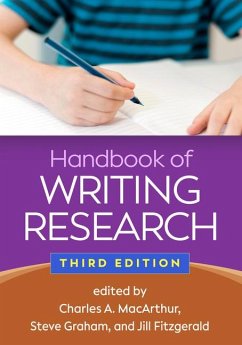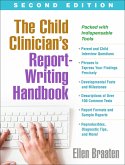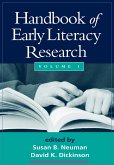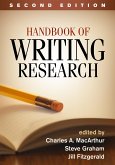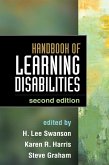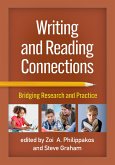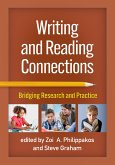Handbook of Writing Research
Herausgeber: MacArthur, Charles A; Fitzgerald, Jill; Graham, Steve
Handbook of Writing Research
Herausgeber: MacArthur, Charles A; Fitzgerald, Jill; Graham, Steve
- Broschiertes Buch
- Merkliste
- Auf die Merkliste
- Bewerten Bewerten
- Teilen
- Produkt teilen
- Produkterinnerung
- Produkterinnerung
Synthesizing the breadth of current research on the teaching and learning of writing, the third edition of this definitive handbook has more than 90% new content, reflecting the growth and dynamism of the field. Leading scholars--including many international voices--review major theories, developmental issues, and instructional approaches for students at all grade levels. Cognitive and sociocultural aspects of writing are explored in depth, as are assessment principles and methods. Issues in teaching students with disabilities, multilingual students, and culturally diverse students are…mehr
Andere Kunden interessierten sich auch für
![Handbook of Writing Research Handbook of Writing Research]() Handbook of Writing Research83,99 €
Handbook of Writing Research83,99 €![The Child Clinician's Report-Writing Handbook The Child Clinician's Report-Writing Handbook]() Ellen Braaten (Massachusetts General Hospital / Harvard Medical SchooThe Child Clinician's Report-Writing Handbook69,99 €
Ellen Braaten (Massachusetts General Hospital / Harvard Medical SchooThe Child Clinician's Report-Writing Handbook69,99 €![Handbook of Early Literacy Research, Volume 1 Handbook of Early Literacy Research, Volume 1]() Handbook of Early Literacy Research, Volume 166,99 €
Handbook of Early Literacy Research, Volume 166,99 €![Handbook of Writing Research, Second Edition Handbook of Writing Research, Second Edition]() Handbook of Writing Research, Second Edition66,99 €
Handbook of Writing Research, Second Edition66,99 €![Handbook of Learning Disabilities Handbook of Learning Disabilities]() Handbook of Learning Disabilities110,99 €
Handbook of Learning Disabilities110,99 €![Writing and Reading Connections Writing and Reading Connections]() Zoi A. PhilippakosWriting and Reading Connections43,99 €
Zoi A. PhilippakosWriting and Reading Connections43,99 €![Writing and Reading Connections Writing and Reading Connections]() Writing and Reading Connections62,99 €
Writing and Reading Connections62,99 €-
-
-
Synthesizing the breadth of current research on the teaching and learning of writing, the third edition of this definitive handbook has more than 90% new content, reflecting the growth and dynamism of the field. Leading scholars--including many international voices--review major theories, developmental issues, and instructional approaches for students at all grade levels. Cognitive and sociocultural aspects of writing are explored in depth, as are assessment principles and methods. Issues in teaching students with disabilities, multilingual students, and culturally diverse students are addressed. The volume discusses innovative research methods and educational technologies and identifies key directions for future investigation. New to This Edition *Chapters on executive functions in writing; disciplinary writing in math, science, and social studies; the role of vocabulary in writing; and formative assessment. *Chapters on source-based writing, source evaluation, and writing development and instruction for African American students. *Chapters on sociocultural aspects of writing--from critical literacies to agency and identity, social justice issues, and more--plus an emphasis on integrating cognitive and sociocultural perspectives throughout.
Hinweis: Dieser Artikel kann nur an eine deutsche Lieferadresse ausgeliefert werden.
Hinweis: Dieser Artikel kann nur an eine deutsche Lieferadresse ausgeliefert werden.
Produktdetails
- Produktdetails
- Verlag: Guilford Publications
- 3rd edition
- Seitenzahl: 480
- Erscheinungstermin: 23. Mai 2025
- Englisch
- ISBN-13: 9781462557271
- ISBN-10: 1462557279
- Artikelnr.: 72219663
- Herstellerkennzeichnung
- Libri GmbH
- Europaallee 1
- 36244 Bad Hersfeld
- gpsr@libri.de
- Verlag: Guilford Publications
- 3rd edition
- Seitenzahl: 480
- Erscheinungstermin: 23. Mai 2025
- Englisch
- ISBN-13: 9781462557271
- ISBN-10: 1462557279
- Artikelnr.: 72219663
- Herstellerkennzeichnung
- Libri GmbH
- Europaallee 1
- 36244 Bad Hersfeld
- gpsr@libri.de
Charles A. MacArthur, PhD, is Professor Emeritus of Special Education and Literacy in the School of Education at the University of Delaware. A former special education teacher, Dr. MacArthur has been conducting research on writing development and instruction for struggling writers since the 1980s. Most recently, he was principal investigator on two grants to develop and examine the efficacy of a writing curriculum for college basic writing courses. Other research projects have focused on the development of a writing curriculum for students with learning disabilities, writing strategy instruction, decoding instruction in adult education, speech recognition as a writing accommodation, project-based learning in social studies in inclusive classrooms, and first-grade writing instruction. Dr. MacArthur is a Fellow of the American Educational Research Association and a recipient of a research award from the Council for Exceptional Children. He has served as coeditor of the Journal of Writing Research and the Journal of Special Education. He has published over 125 articles and book chapters and is coeditor or coauthor of several books. Steve Graham, EdD, is a Regents Professor and the Warner Professor in the Division of Leadership and Innovation at Mary Lou Fulton Teachers College, Arizona State University. Since the 1980s, he has studied how writing develops, how to teach it effectively, and how it can be used to support reading and learning. Dr. Graham's research involves typically developing writers and students with special needs in both elementary and secondary schools, with much of this research occurring in classrooms in urban schools. Dr. Graham is a recipient of the Thorndike Career Award from Division 15 of the American Psychological Association, the William S. Gray Citation of Merit from the International Literacy Association, and the Exemplary Research in Teaching and Teacher Education Award from Division K of the American Educational Research Association, among other awards. He is the former editor of several journals, including the Journal of Writing Research; coauthor of three influential Carnegie Corporation reports on writing; and coauthor or coeditor of several books. Jill Fitzgerald, PhD, is Research Professor and Professor Emerita in the School of Education at The University of North Carolina at Chapel Hill. A former primary-grades teacher and reading specialist, she has most recently conducted research on literacy issues involving multilingual learners, text complexity, and vocabulary measurement. Dr. Fitzgerald is a member of the Reading Hall of Fame, a Fellow of the American Educational Research Association (AERA), and a recipient of research awards from Phi Delta Kappa, the International Literacy Association, and the AERA. She has published over 150 works, is currently associate editor of the Journal of Educational Psychology, and serves on the editorial boards of several other journals. Dr. Fitzgerald also has received university teaching and advisement awards and has been a review panelist for the Office of Education, the Institute of Education, the National Institutes of Health, and the National Institute for Literacy.
Introduction
Charles A. MacArthur
Steve Graham
& Jill Fitzgerald I. Theories and Models of Writing 1. The Writer(s)-within-Communities Model
Steve Graham & Angelique Aitken 2. Models of Writing from a Cognitive Perspective
Charles A. MacArthur 3. Sociocultural Perspectives in Writing Research
Richard Beach
Kevin Roozen
& Anna Smith II. Cognitive and Social Aspects of Writing 4. Early Writing Development and Practice
Hope K. Gerde & Gary E. Bingham 5. Development of Control Mechanisms: Attention
Executive Control
Working Memory
Teresa Limpo 6. Understanding Writing Motivation in Context
Sharon Zumbrunn & Bailey Bontrager 7. The Science of Reading-Writing Connections
Young-Suk Grace Kim 8. Vocabulary in Writing: Processes and Products
Jill Fitzgerald 9. Sociocultural Aspects of Composing
Linda Harklau & Shim Lew III. Instruction in Writing 10. Essences for Designing Interventions in Writing Research
Gert Rijlaarsdam
Liselore van Ockenburg
Mar Mateos
& Daphne van Weijen 11. What Do Meta-Analyses Tell Us about the Teaching of Writing?
Steve Graham 12. Current Writing Instruction in Schools: Centripetal and Centrifugal Forces in Theory
Method
and Practice
Kristen C. Wilcox & Jill V.Jeffery 13. Teaching Language for Disciplinary Writing within Mathematics
Science
and Social Studies Classrooms: Current Approaches and Future Directions
Emily Phillips Galloway
Joshua Bednorz
& Bailey Buchanan 14. Reimagining Grammar Instruction: Nurturing a Repertoire of Infinite Possibilities
Debra Myhill
Ruth Newman
& Annabel Watson 15. Computer-Based Writing Instruction
Andrew Potter
Joshua Wilson
Rod D. Roscoe
Tracy Arner
& Danielle S. McNamara 16. Synthesis in Source-Based Writing
Mar Mateos & Gert Rijlaarsdam 17. Writing to Learn
David Galbraith
Veerle M. Baaijen
Amy Peters
& Sophie M. Hall 18. Source Evaluation
Ivar Bräten
Natalia Latini
& Ladislao Salmerón 19. Sociocultural Approaches to Centering the Developing Writer in Writing Instruction
Anna Smith
Sonia Kline
Grace Kang
Kevin Roozen
& Richard Beach 20. Professional Development in Writing Instruction
April Camping
Debra McKeown
Michael Williams
& Karen Harris IV. Writing Assessment 21. How Effective Is Feedback to Writing for Different Language Learners?: What We Know from Current Meta-Analytical Evidence
Sina Scherer & Vera Busse 22. Advances in Automated Writing Evaluation
Laura K. Allen & Scott A. Crossley 23. Formative Feedback in Writing: A Scoping Review
Anastasiya A. Lipnevich & Ligia Tomazin V. Writing and Special Populations 24. Writing in Students with Diverse Abilities: A Consideration of Disability Causal Theories
Gary A. Troia 25. Second-Language Writing and Writers in Educational Contexts
Marlene Tovar
Xiao Tan
& Paul Kei Matsuda 26. Writing and African American Students: Enduring Dilemmas and Transformative Possibilities
Teaira McMurtry & Arnetha F. Ball Author Index Subject Index
Charles A. MacArthur
Steve Graham
& Jill Fitzgerald I. Theories and Models of Writing 1. The Writer(s)-within-Communities Model
Steve Graham & Angelique Aitken 2. Models of Writing from a Cognitive Perspective
Charles A. MacArthur 3. Sociocultural Perspectives in Writing Research
Richard Beach
Kevin Roozen
& Anna Smith II. Cognitive and Social Aspects of Writing 4. Early Writing Development and Practice
Hope K. Gerde & Gary E. Bingham 5. Development of Control Mechanisms: Attention
Executive Control
Working Memory
Teresa Limpo 6. Understanding Writing Motivation in Context
Sharon Zumbrunn & Bailey Bontrager 7. The Science of Reading-Writing Connections
Young-Suk Grace Kim 8. Vocabulary in Writing: Processes and Products
Jill Fitzgerald 9. Sociocultural Aspects of Composing
Linda Harklau & Shim Lew III. Instruction in Writing 10. Essences for Designing Interventions in Writing Research
Gert Rijlaarsdam
Liselore van Ockenburg
Mar Mateos
& Daphne van Weijen 11. What Do Meta-Analyses Tell Us about the Teaching of Writing?
Steve Graham 12. Current Writing Instruction in Schools: Centripetal and Centrifugal Forces in Theory
Method
and Practice
Kristen C. Wilcox & Jill V.Jeffery 13. Teaching Language for Disciplinary Writing within Mathematics
Science
and Social Studies Classrooms: Current Approaches and Future Directions
Emily Phillips Galloway
Joshua Bednorz
& Bailey Buchanan 14. Reimagining Grammar Instruction: Nurturing a Repertoire of Infinite Possibilities
Debra Myhill
Ruth Newman
& Annabel Watson 15. Computer-Based Writing Instruction
Andrew Potter
Joshua Wilson
Rod D. Roscoe
Tracy Arner
& Danielle S. McNamara 16. Synthesis in Source-Based Writing
Mar Mateos & Gert Rijlaarsdam 17. Writing to Learn
David Galbraith
Veerle M. Baaijen
Amy Peters
& Sophie M. Hall 18. Source Evaluation
Ivar Bräten
Natalia Latini
& Ladislao Salmerón 19. Sociocultural Approaches to Centering the Developing Writer in Writing Instruction
Anna Smith
Sonia Kline
Grace Kang
Kevin Roozen
& Richard Beach 20. Professional Development in Writing Instruction
April Camping
Debra McKeown
Michael Williams
& Karen Harris IV. Writing Assessment 21. How Effective Is Feedback to Writing for Different Language Learners?: What We Know from Current Meta-Analytical Evidence
Sina Scherer & Vera Busse 22. Advances in Automated Writing Evaluation
Laura K. Allen & Scott A. Crossley 23. Formative Feedback in Writing: A Scoping Review
Anastasiya A. Lipnevich & Ligia Tomazin V. Writing and Special Populations 24. Writing in Students with Diverse Abilities: A Consideration of Disability Causal Theories
Gary A. Troia 25. Second-Language Writing and Writers in Educational Contexts
Marlene Tovar
Xiao Tan
& Paul Kei Matsuda 26. Writing and African American Students: Enduring Dilemmas and Transformative Possibilities
Teaira McMurtry & Arnetha F. Ball Author Index Subject Index
Introduction
Charles A. MacArthur
Steve Graham
& Jill Fitzgerald I. Theories and Models of Writing 1. The Writer(s)-within-Communities Model
Steve Graham & Angelique Aitken 2. Models of Writing from a Cognitive Perspective
Charles A. MacArthur 3. Sociocultural Perspectives in Writing Research
Richard Beach
Kevin Roozen
& Anna Smith II. Cognitive and Social Aspects of Writing 4. Early Writing Development and Practice
Hope K. Gerde & Gary E. Bingham 5. Development of Control Mechanisms: Attention
Executive Control
Working Memory
Teresa Limpo 6. Understanding Writing Motivation in Context
Sharon Zumbrunn & Bailey Bontrager 7. The Science of Reading-Writing Connections
Young-Suk Grace Kim 8. Vocabulary in Writing: Processes and Products
Jill Fitzgerald 9. Sociocultural Aspects of Composing
Linda Harklau & Shim Lew III. Instruction in Writing 10. Essences for Designing Interventions in Writing Research
Gert Rijlaarsdam
Liselore van Ockenburg
Mar Mateos
& Daphne van Weijen 11. What Do Meta-Analyses Tell Us about the Teaching of Writing?
Steve Graham 12. Current Writing Instruction in Schools: Centripetal and Centrifugal Forces in Theory
Method
and Practice
Kristen C. Wilcox & Jill V.Jeffery 13. Teaching Language for Disciplinary Writing within Mathematics
Science
and Social Studies Classrooms: Current Approaches and Future Directions
Emily Phillips Galloway
Joshua Bednorz
& Bailey Buchanan 14. Reimagining Grammar Instruction: Nurturing a Repertoire of Infinite Possibilities
Debra Myhill
Ruth Newman
& Annabel Watson 15. Computer-Based Writing Instruction
Andrew Potter
Joshua Wilson
Rod D. Roscoe
Tracy Arner
& Danielle S. McNamara 16. Synthesis in Source-Based Writing
Mar Mateos & Gert Rijlaarsdam 17. Writing to Learn
David Galbraith
Veerle M. Baaijen
Amy Peters
& Sophie M. Hall 18. Source Evaluation
Ivar Bräten
Natalia Latini
& Ladislao Salmerón 19. Sociocultural Approaches to Centering the Developing Writer in Writing Instruction
Anna Smith
Sonia Kline
Grace Kang
Kevin Roozen
& Richard Beach 20. Professional Development in Writing Instruction
April Camping
Debra McKeown
Michael Williams
& Karen Harris IV. Writing Assessment 21. How Effective Is Feedback to Writing for Different Language Learners?: What We Know from Current Meta-Analytical Evidence
Sina Scherer & Vera Busse 22. Advances in Automated Writing Evaluation
Laura K. Allen & Scott A. Crossley 23. Formative Feedback in Writing: A Scoping Review
Anastasiya A. Lipnevich & Ligia Tomazin V. Writing and Special Populations 24. Writing in Students with Diverse Abilities: A Consideration of Disability Causal Theories
Gary A. Troia 25. Second-Language Writing and Writers in Educational Contexts
Marlene Tovar
Xiao Tan
& Paul Kei Matsuda 26. Writing and African American Students: Enduring Dilemmas and Transformative Possibilities
Teaira McMurtry & Arnetha F. Ball Author Index Subject Index
Charles A. MacArthur
Steve Graham
& Jill Fitzgerald I. Theories and Models of Writing 1. The Writer(s)-within-Communities Model
Steve Graham & Angelique Aitken 2. Models of Writing from a Cognitive Perspective
Charles A. MacArthur 3. Sociocultural Perspectives in Writing Research
Richard Beach
Kevin Roozen
& Anna Smith II. Cognitive and Social Aspects of Writing 4. Early Writing Development and Practice
Hope K. Gerde & Gary E. Bingham 5. Development of Control Mechanisms: Attention
Executive Control
Working Memory
Teresa Limpo 6. Understanding Writing Motivation in Context
Sharon Zumbrunn & Bailey Bontrager 7. The Science of Reading-Writing Connections
Young-Suk Grace Kim 8. Vocabulary in Writing: Processes and Products
Jill Fitzgerald 9. Sociocultural Aspects of Composing
Linda Harklau & Shim Lew III. Instruction in Writing 10. Essences for Designing Interventions in Writing Research
Gert Rijlaarsdam
Liselore van Ockenburg
Mar Mateos
& Daphne van Weijen 11. What Do Meta-Analyses Tell Us about the Teaching of Writing?
Steve Graham 12. Current Writing Instruction in Schools: Centripetal and Centrifugal Forces in Theory
Method
and Practice
Kristen C. Wilcox & Jill V.Jeffery 13. Teaching Language for Disciplinary Writing within Mathematics
Science
and Social Studies Classrooms: Current Approaches and Future Directions
Emily Phillips Galloway
Joshua Bednorz
& Bailey Buchanan 14. Reimagining Grammar Instruction: Nurturing a Repertoire of Infinite Possibilities
Debra Myhill
Ruth Newman
& Annabel Watson 15. Computer-Based Writing Instruction
Andrew Potter
Joshua Wilson
Rod D. Roscoe
Tracy Arner
& Danielle S. McNamara 16. Synthesis in Source-Based Writing
Mar Mateos & Gert Rijlaarsdam 17. Writing to Learn
David Galbraith
Veerle M. Baaijen
Amy Peters
& Sophie M. Hall 18. Source Evaluation
Ivar Bräten
Natalia Latini
& Ladislao Salmerón 19. Sociocultural Approaches to Centering the Developing Writer in Writing Instruction
Anna Smith
Sonia Kline
Grace Kang
Kevin Roozen
& Richard Beach 20. Professional Development in Writing Instruction
April Camping
Debra McKeown
Michael Williams
& Karen Harris IV. Writing Assessment 21. How Effective Is Feedback to Writing for Different Language Learners?: What We Know from Current Meta-Analytical Evidence
Sina Scherer & Vera Busse 22. Advances in Automated Writing Evaluation
Laura K. Allen & Scott A. Crossley 23. Formative Feedback in Writing: A Scoping Review
Anastasiya A. Lipnevich & Ligia Tomazin V. Writing and Special Populations 24. Writing in Students with Diverse Abilities: A Consideration of Disability Causal Theories
Gary A. Troia 25. Second-Language Writing and Writers in Educational Contexts
Marlene Tovar
Xiao Tan
& Paul Kei Matsuda 26. Writing and African American Students: Enduring Dilemmas and Transformative Possibilities
Teaira McMurtry & Arnetha F. Ball Author Index Subject Index

